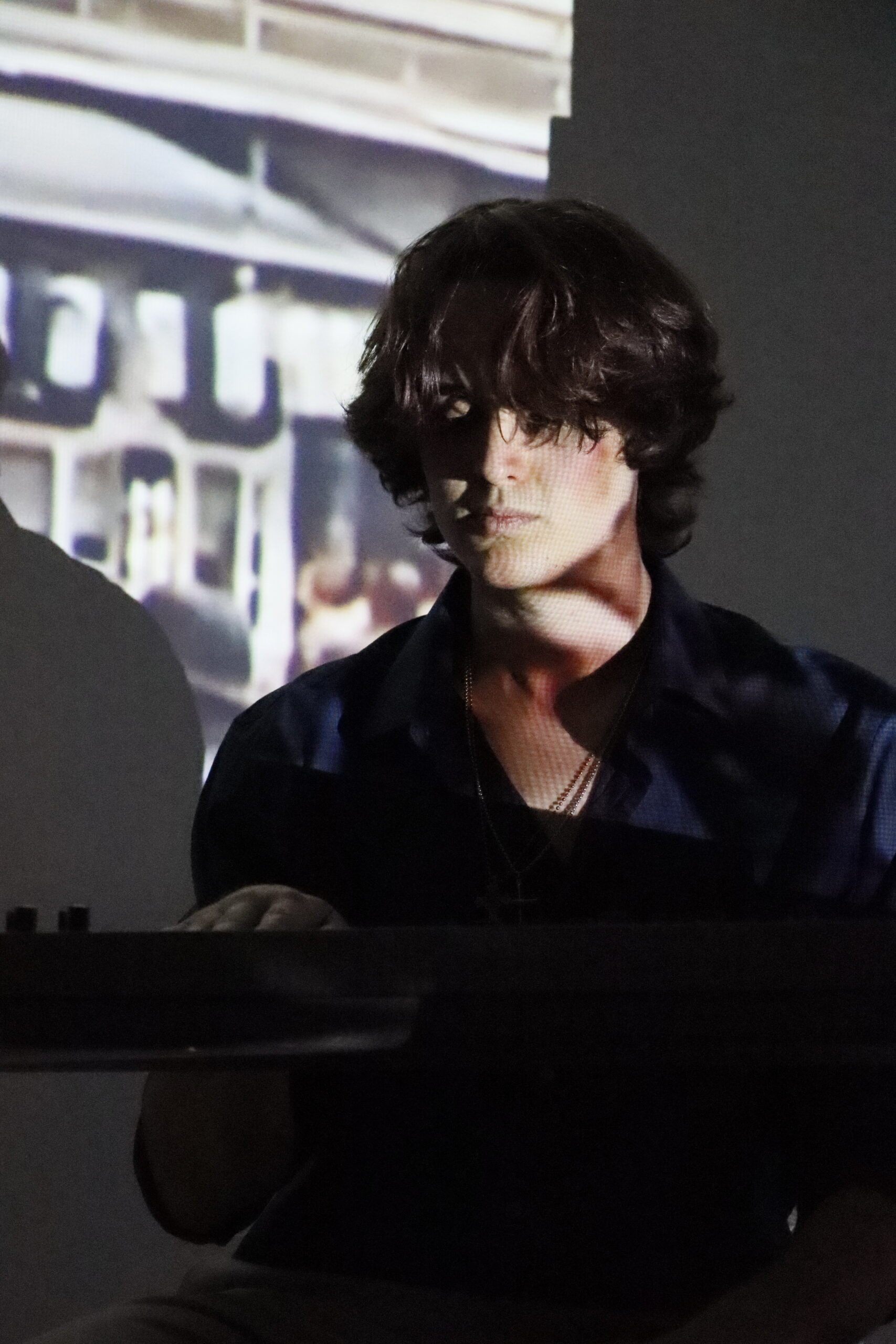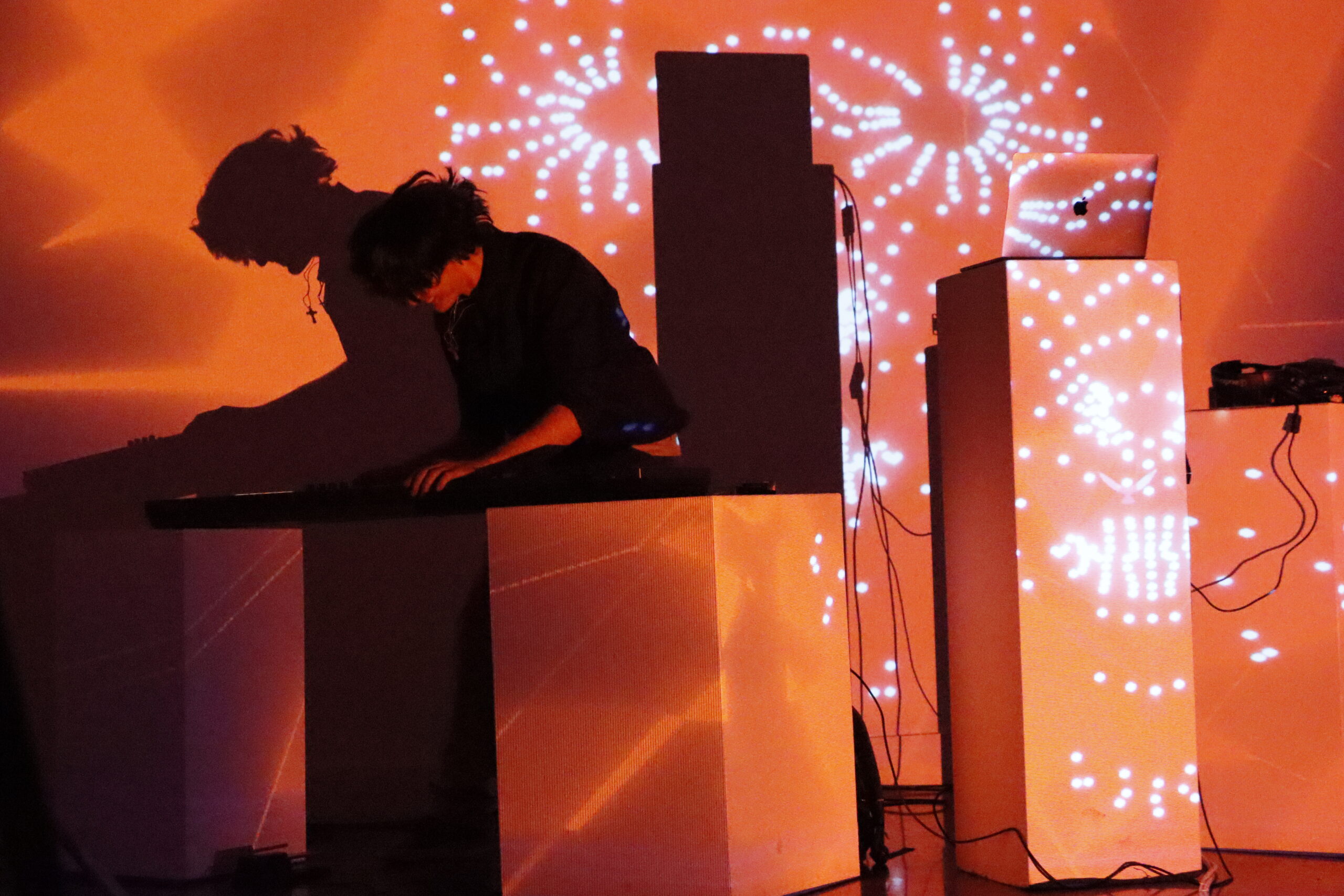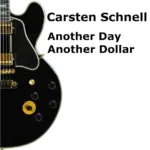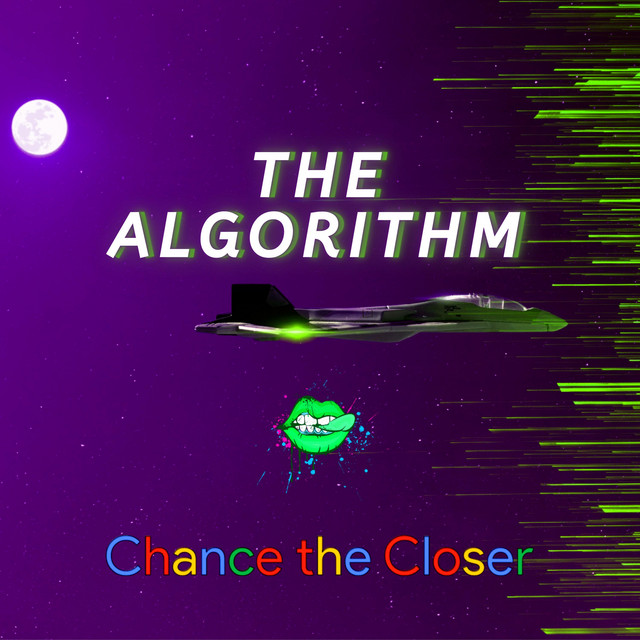“Past The Ladder Of Horizon” is a compilation of five ambient-electronic pieces of music from Adam Schmieder, an LA-based artist who specializes in the production and composition of electronic, neo-minimalist, experimental, and avant-pop music. This EP is Adam’s first official music release and was put out to the public on October 31st, 2022, hitting a total runtime of 49 minutes and 24 seconds. The tracks featured on this record employ a vast range of experimental approaches, while still managing to evoke emotions reminiscent of a cathartic experience; a sense of overpowering beauty, with splashes of epic splendor, interspersed. Overall, this project simply pierces one’s soul and is an exceptionally gratifying experience for the listener, and because we admired Adam Schmieder’s work so much, we conducted a conversation to know more about his career and the ideas behind this project. Have fun listening to what Adam has to say!
Songweb: Describe your background and who you are.
Adam Schmieder: Hey, how’s it going? My name is Adam Schmieder, and I’m a 23-year-old producer and composer based out of Los Angeles, California. I studied Music Composition at the University of California, Santa Barbara; but I also have a background in computer science and programming, and am immensely interested in applying electronic and computer techniques within my compositional process. Thus, I tend to merge my two spheres of influence in most if not all of my music -the training in classical composition and its connotative language, and the fascination with experimental electronic techniques and the sounds they generate-; with the general philosophical principle that I apply to be the amalgamation of familiar sounds (traditional, classical) with unfamiliar sounds (experimental, electronic, bizarre) in the fashioning of something truly new and beautiful. My debut EP, “Past The Ladder Of Horizon,” is one such exemplar of said principle; in which I largely rely on experimental techniques (granulation, spectral analysis, algorithmic composition, time-warp, and stretch) in combination with more neoclassical influences (minimalism and ambiance) in the evocation of this dark and existential, yet also gripping and beautiful atmosphere. However, my musical tastes and interests extend past my musical endeavors and make their way into the film, videogame, and music production work that I do on the side. In addition, I also dabble in 3D visuals and rendering and typically apply these skills toward the creation of music videos for my tracks and projects. If you would like to learn more about my creative endeavors, then check out my website here!: https://www.adamschmieder.com/
If you have gotten a chance to listen to any of the music that I’ve put out -either the project currently released at the time of this review or any of the future projects I’ve put out since- then I sincerely hope it has been an effective piece of art and has left a valuable and noteworthy experience in your life!
Songweb: What inspired you to pursue music?
Adam Schmieder: I’ve always expressed an innate interest in music since I was very young; I think I began composing at around 10 years old, for some type of piano assignment that I had in school. I had other focuses that came and went as I continued to grow up, such as chemistry, biology, computer science, mathematics, and philosophy; but the backbone that remained throughout my flux of interests was always music. Perhaps the ‘what’ or the ‘reason’ why I chose music over other routes has been consistent and firm in the belief that I’m just exceptionally good at its composition. My own philosophical and religious notions also motivate my desire to compose and create; in the sense that my set of beliefs and mental axioms I hold directly influence the actions I make, and the art that I put out holding those beliefs directly results in the creation of the art that I make and release. My hope would be someone stumbling upon my music, assessing its quality as ‘good’ or even ‘exceptional,’ and then further asking themselves “How does this person make this quality of art?” before stumbling upon an interview like this one, where I can make an argument for my Catholic faith as a direct causal force and a major influential factor behind the art that I create, and recommend the same set of beliefs and axioms I hold if one wants to create art of my caliber.
Songweb: What is it about music that evokes such strong emotions in you?
Adam Schmieder: This question seems to probe what music is, or the reasoning for why music itself is so effective at evoking and communicating emotion within the human person; ie., this question probes at something philosophical as to why music is an emotional and the evocative art form and I think I can give you a pretty good answer. Let’s imagine the scenario of intense emotion; something like an argumentative fit between a son and his overprotective mother. Maybe this family is broken, and there was once another son in the picture, who died of some sort of accident like a car crash. Let’s say that this angry and argumentative back-and-forth progresses from the mother and son being exceptionally angry at each other -where the mother touts reasons as to why the son is being foolish- to a heart-wrenching comment from the son that the mother is withholding his life because of fears that he would end up like his deceased brother, to where they both walk away heartbroken and hollow. Now, had you been the son or the mother, you would be directly in the seat of experiencing these intense emotions; anger, worry, hollowness, sadness, etc., as you are directly experiencing these emotions in the course of this argument. Now, let’s say that this argument is part of a film, and is displayed in a theater for the audience to watch. While perceiving this argument unfold, audience members might picture themselves in the shoes of the son or the mother; regardless of the gender of the audience member. Maybe a teenage girl relates to the plight of the son in her problems with her mother or father, or maybe a parent realizes their overprotective nature towards their children; or even extended further, maybe these relations are between grandparents, friends, siblings, or spouses and husband. However these relations are analogized by the members of the audience, they are still within the context of this argumentative scene that is unfolding before them on the screen; where a general setting and relationship are implied by the individuals on the screen, and where the audience member ‘fills in the shoes’ from their own experiences, relationships, and characters from their own lives. Now, instead of watching this scene unfold on a screen, imagine a ‘piece of music that attempts to convey those emotions while in a purely musical setting; that is, no visuals are supplied, just the audio, using instrumentations of sound and tone (without just using the audio from the argument, as that would bring us back down a level of specificity). This piece of music may exemplify some of the linguistic inflections of a real-life argument in an attempt at conveying those emotions- such as sporadic noise, ramped increase in dynamics and volume, or the pounding drums as if of a heartbeat. However, this ‘piece of music itself would have the goal of evoking the emotions of the argument, without actually being the argument itself (as in this is not a video or recording of an argument); and because we have now ascended a level of specificity into more generality, wherein the music itself attempts to convey the emotions of an argument without directly conveying particular characters or particular arguments, then the audience is left to ‘fill in the shoes’ of how they might experience these emotions themselves in whatever way they fantasize or relate to. Whereas, since the emotions of “anger, worry, hollowness, sadness” are expressed narratively in musical form (music as a linguistic phenomenon), the audience can relate to the emotions in a far more general sense, and what they fantasize as ‘filling in’ the shoes of what those emotions resulting from are far more general than viewing the argument, or even being involved in the argument itself. It is here where music has its pull and evocative power; in its ability to convey a coherent narrative of emotion across a passage of time (much like an argument), but in a far more general sense- such that it evokes fantasies within the listener, or causes them to form relations with their own life, as they imagine scenarios and events that would elicit such emotions. That is, what ‘it is’ about music that evokes such strong emotions within such a massive quantity of human beings is its ability to hone in on the evocation of general emotions (via more specific musical techniques, like mimicking linguistic inflections or juxtaposing ‘consonance’ and ‘dissonance’) in such a way that it directly evokes the listeners’ imagination and causes them to fantasize scenarios or form relations from their own life to the emotions that are being elicited.
Songweb: Describe the steps you take to create a new song.
Adam Schmieder: Honestly, this process is sporadic. Sometimes I come up with the material for a new song simply by messing around on the keyboard, or playing with samples; tracks like Catharsis and Intersecting Point came about this way. Other times, I have a set aesthetic I want to implement (usually spontaneously arising while in the shower, or over an extended period), and then I work at implementing that idea into reality until it reaches its completed state; tracks like Mythis Avanae or To The Light came about this way. But, if I were to pinpoint a methodology in how I create my music, I would probably expand upon the first description I’ve listed here; messing around on instruments, vocals, and sample manipulation, until you hear something that makes you think “Hey, that’s cool,” and then work from there. However, doing this method most of the time will have you coming in with no set idea, no preconception, of what you will make and how it will sound like; the music will just sort of ‘arise.’
Songweb: Describe your project, “Past The Ladder Of Horizon” for us.
Adam Schmieder: “Past The Ladder Of Horizon” is my first foray into the realm of experimental and electronic ambient music- employing a variety of experimental techniques that I’ve picked up over the past couple of years, and attempting to reach a cathartic and overwhelming state of ‘beauty’ that would be discernible by the audience (amongst the sea of unfamiliar and bizarre sounds). Cover 2+ years, and consists of tracks that were largely composed in separation from each other; without necessarily having a pre-conceived notion of “I want to make an ambient record, and I want to make some tracks for this record,” and more so, consists of tracks having spawned naturally at different points in my compositional career within the past couple of years, before being thematically and narratively assembled, iterated, and altered after the fact- with the final resulting amalgamation being this project. I have a bad habit of getting too much in my head about releasing music (perfectionism, thematic similarities between tracks, what tracks are “good” or “bad” for release), and consequently, never releasing my musical projects on streaming services, despite the desire from friends and my small audience for them to release. After talking with some close friends about this issue (while in a jacuzzi), they essentially informed me that I need to not be making such a big deal about this because my music will never see the light of day if I continue thinking and acting this way. This project stands as the first actualized ‘step’ of the plan I formulated after that conversation; and to me personally, this project stands as a “test run” of the musical release formula (deadlines, marketing, merchandise, reaching out) that I must become acquainted with to successfully release the music that I’ve already created and the music that I have yet to create.

Songweb: What societal impact do you expect “Past The Ladder Of Horizon” to have?
Adam Schmieder: I don’t know about ‘social’ impact, but I hope it leaves an impact on the world of experimental-electronic ambient music and soundscapes, á la artists like Tim Hecker or Oneohtrix Point Never. I think I can comfortably say that a couple of years from now, outlook back upon this project and stand proud of its freshness and unique flavor about other ambient records released at the time.
Songweb: What do you hope the critics will say about your newest project?
Adam Schmieder: Honestly, I just hope that the tracks I care about have their desired evocative effects; tracks like Glory: The Abrasion of Fear, or Catharsis. These tracks take the listener on a truly massive journey, and I just hope that the emotions and narrative implications that I’ve packed into these tracks come through in the listening
experience. I don’t like “spoiling” the emotions or discussing the implications of my music much (probably because I have enough confidence that these emotions should shine through on their own), but these tracks are supposed to be overwhelming, existential, mystical, and terrifyingly beautiful. As long as these desired emotions prove to be translatable across the listening experience, then I am happy.
Songweb: Identify the best and worst aspects of being a musician.
Adam Schmieder: To me, the worst aspect of working as a solo musician is that every deadline is completely self-motivated; insofar as they do not have any real weight, past perhaps some disgruntled fans. Part of the reason why I liked the academic grind so much was that it gave my life total structure; some things needed to be done, deadlines had to be met, and there weren’t any real exceptions to the rule. Building that structure from the ground up on your own is quite difficult, and I’m currently still learning that as I continue to try and motivate myself to get through some larger projects in the works. However, something that I’ve learned that other artists might find valuable is this: It’s all a mental game. You have to sort of ‘trick’ yourself to get real work done. If you go in thinking “I have to do work,” then chances are, you won’t get any work done, and it won’t be much fun either. Even opening the file or pressing play will feel so much like a chore, that you won’t even be able to begin working, and instead, will continuously push it off (at least in my case). Instead, the goal is to sort of ‘trick’ yourself into going into a project or session without thinking of it as a pile of work that you must complete. The way that’s worked for me is mentally picturing what my friends’ reactions will be when I show them a new banger, or a crazy experimental beat, or something more low-key; and this alone drives a lot of my compositional process, without going in thinking that I have a pile of work to finish, which inevitably lends itself to a miserable time.
Songweb: What can we do to support your career advancement?
Adam Schmieder: Follow my social media! I’m very active on Instagram and youtube, and I frequently post snippets of upcoming music or other content on these platforms, as well as any updates on solo or collaborative projects. If you want to support the grind, then check out my Bandcamp profile; I’ve got T-Shirts and CDs for “Past The Ladder Of Horizon” upon there, and purchases of either include an additional bonus track not featured on streaming services.
Instagram: https://www.instagram.com/chictapi/
YouTube: https://www.youtube.com/channel/UCoCIDPuD9X_BxYMo-J2A_uA
Bandcamp: https://adamschmieder.bandcamp.com/album/past-the-ladder-of-horizon
Songweb: Describe your future artistic plans.
Adam Schmieder: “Past The Ladder Of Horizon” stands as probably my first and only pure ‘ambient’ record, as the music I have planned from here on out will be more avant-pop, experimental-EDM, bizarre-but-vibey types of tracks. There will still be trace elements of my ‘ambient’ style in these other tracks, but my artistic endeavors will shift away from ‘pure ambiance’ into this more accessible, but bizarrely experimental, type of pop/EDM/
club/house music. My next immediate artistic endeavor will be the release of a plethora of singles within the said genre of music; music that I’ve already made (at least in a demo form), that will be extended, modified and polished for release. My goal is to release a single every 2-3 weeks, for an extended period, before the next major project;
my true debut album, which is a massive project that consists of around 1h and 15m of music that I’ve been working on for even longer than PTLOH (around 3 years of work so far). This new project will be my most emotionally invested and labor-intensive project to date and is set to release sometime in mid-2023. Past that, I don’t know; I have some ideas of making a ‘pure minimalism’ type of album, using solely organic instruments (something along the lines of Steve Reich), and also other ideas for more ‘banger’ or easily accessible music projects, or even more experimental-type music, where I go and learn more advanced and bizarre techniques that I can apply in my
compositional process. All in all, I have a lot of exciting stuff planned for the future, and I encourage anyone who would like to be kept up to date to follow my social media (Instagram and youtube mainly), as I am very active on those platforms, and regularly post snippets and demos from current projects.
Overall, “Past The Ladder Of Horizon” is a fantastic piece of art. I simply cannot express how incredible this project is with words. The music is metamorphic and transformative in many diverse ways, and manages to feature moments of both comforting relaxation and abrasive intensity; without deviating from the overarching narrative of the project as a whole. I personally can’t wait to hear more from this amazing talent.
Listen to The “Past The Ladder Of Horizon” EP by Adam Schmieder on Spotify or SoundCloud and let us know your thoughts!
You can follow Adam below for more information.






